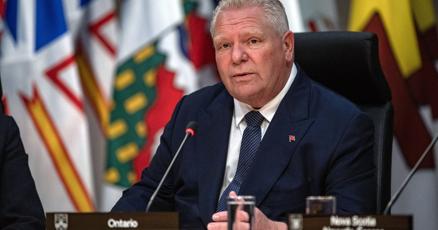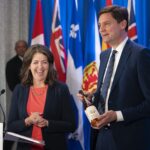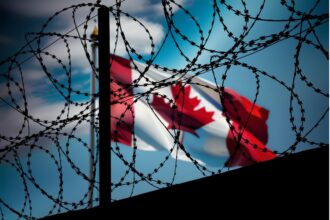In a bold diplomatic move, Ontario Premier Doug Ford is heading back to Washington this week, determined to protect Canadian interests against the looming threat of punitive tariffs from the Trump administration. The high-stakes visit comes at a critical juncture as economic tensions between the longtime allies threaten to disrupt billions in cross-border trade.
“We’re not going to sit back and let anyone push us around,” Ford declared during a press conference at Queen’s Park on Monday. “Ontario’s economy is deeply integrated with the United States, and these tariffs would hurt workers on both sides of the border.”
The premier’s upcoming trip marks his second journey to the American capital in recent months, underscoring the gravity of the situation for Canada’s most populous province. Ford’s mission is straightforward yet challenging: convince key Republican lawmakers and Trump allies that imposing blanket tariffs would devastate the intricate supply chains that have developed over decades under free trade agreements.
Economic analysts at the Royal Bank of Canada estimate that Trump’s proposed 10-25% tariffs on Canadian goods could jeopardize nearly $300 billion in annual trade between Ontario and the United States alone. The automotive sector, which employs thousands in southern Ontario, stands particularly vulnerable as components often cross the border multiple times before a vehicle is completed.
“This isn’t just about protecting Canadian jobs—though that’s certainly my top priority,” Ford emphasized. “American consumers will pay higher prices, American factories will face parts shortages, and American workers could lose their jobs too. It’s a lose-lose proposition.”
Ford’s diplomatic offensive comes as Canadian political leaders across party lines mobilize to address what many see as the most significant threat to Canada-US economic relations in a generation. Prime Minister Justin Trudeau has reportedly been coordinating with provincial premiers to present a unified Canadian response.
What distinguishes Ford’s approach is his deliberate targeting of Republican lawmakers from states with strong economic ties to Ontario. The premier plans to meet with senators and representatives from Michigan, Ohio, and New York—states where the integrated automotive supply chain supports hundreds of thousands of jobs.
“I speak their language,” Ford said, referring to his business background. “This isn’t about politics—it’s about prosperity. The numbers don’t lie, and I’m bringing those numbers to Washington.”
The premier will be accompanied by a delegation of Ontario business leaders, including representatives from the automotive, steel, and agricultural sectors—all industries that would face severe disruption under new tariff regimes. Their firsthand accounts will be instrumental in illustrating the real-world consequences of protectionist policies.
Trade experts note that Ford’s approach of state-level diplomacy may prove effective given the complexities of American federalism and the significant economic interests at stake. Dr. Margaret Chen of the University of Toronto’s Munk School of Global Affairs explained, “When governors and state legislators hear directly from their major trading partners about potential job losses in their districts, it creates political pressure that can influence federal policy.”
The stakes couldn’t be higher for Ontario, with approximately 1.3 million jobs directly tied to trade with the United States. The province exports everything from automobiles and machinery to minerals and agricultural products across the border, generating approximately $400 billion in economic activity annually.
As Canada braces for potential economic turbulence, the question remains: can provincial diplomacy succeed where federal efforts have struggled, or are we witnessing the beginning of a fundamental reshaping of North American trade relationships that will transform both economies for generations to come?










